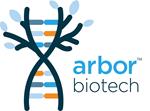Arbor Biotechnologies Announces FDA Orphan Drug and Rare Pediatric Disease Designations Granted to ABO-101 for the Treatment of Primary Hyperoxaluria Type 1 (PH1) and Upcoming Presentations at the 20th Congress of the International Pediatric Nephrology As
Orphan Drug and Rare Pediatric Disease designations follow U.S. FDA acceptance of IND application for ABO-101 for the treatment of PH1, with Phase 1/2 trial initiation anticipated in H1 2025.
IPNA presentations to include preclinical data supporting ABO-101 and design of redePHine, a Phase 1/2 clinical study evaluating the safety, tolerability, and preliminary efficacy of ABO-101 in adult and pediatric patients with PH1.
CAMBRIDGE, Mass., Feb. 05, 2025 (GLOBE NEWSWIRE) -- Arbor Biotechnologies™, a biotechnology company discovering and developing the next generation of genetic medicines, today announced that the U.S. Food and Drug Administration (FDA) has granted orphan drug designation (ODD) and rare pediatric disease designation (RPDD) to ABO-101 for the treatment of primary hyperoxaluria type 1 (PH1). The designations closely follow the FDA’s clearance of the investigational new drug (IND) application for the novel gene editing therapeutic in December 2024.
PH1 is a rare genetic kidney disease associated with an overproduction of oxalate that often presents in children, causing kidney stones, kidney damage, and eventual kidney failure. The FDA’s ODD and RPDD programs are designed to support the development and evaluation of new treatments for serious and life-threatening rare diseases affecting fewer than 200,000 people (ODD) or children under 18 years of age (RPDD). The FDA orphan drug and rare pediatric disease designations qualify Arbor for various incentives including tax credits and exemption from certain FDA application fees, as well as the potential for market exclusivity and eligibility for a pediatric priority review voucher upon approval.
“ABO-101 receiving rare pediatric disease and orphan drug designations from the FDA for the potential treatment of PH1 underscores the urgent need for novel treatment options,” said Dan Ory, M.D., Chief Medical Officer of Arbor Biotechnologies. “As Arbor advances ABO-101 into the clinic with the initiation of the redePHine Phase 1/2 clinical study, these designations reinforce the potential of ABO-101 to deliver lasting disease modification as a first-in-class gene editing therapy for PH1.”
Later this month, Arbor will showcase preclinical data supporting ABO-101 and outline the design of the redePHine Phase 1/2 study evaluating the safety, tolerability, PK/PD, and preliminary efficacy of ABO-101 in both adult and pediatric patients with PH1 in an oral presentation and industry symposium at the 20th Congress for the International Pediatric Nephrology Association (IPNA) taking place February 19 – 23 in Cape Town, South Africa.
- Inherited Disorders Symposium: February 21, 2025, from 8:50-10:40am SAST
- Development of ABO-101, A Novel Gene Editing Therapy for Primary Hyperoxaluria Type 1, Winston Yan, M.D., Ph.D.
- Innovations & Industry Symposium: February 22, 2025, from 10:15-11:00am SAST
- Advances in CRISPR Gene Editing for Pediatric Nephrology: ABO-101 for Treatment of Primary Hyperoxaluria Type 1, Winston Yan, M.D., Ph.D.
About ABO-101
ABO-101 is a novel, investigational gene editing medicine designed to be a one-time liver-directed gene editing treatment that results in a permanent loss of function of the HAO1 gene in the liver to reduce PH1-associated oxalate production. PH1 is a rare genetic disorder in which enzyme deficiencies in the liver lead to the overproduction and buildup of oxalate, resulting in kidney stones eventually leading to end stage kidney disease and systemic oxalosis. ABO-101 is designed to knock down HAO1 gene expression in the liver, thereby providing durable reduction in oxalate production. ABO-101 consists of a lipid nanoparticle (LNP), licensed from Acuitas Therapeutics, encapsulating messenger RNA expressing a novel Type V CRISPR Cas12i2 nuclease and an optimized guide RNA which specifically targets the human HAO1 gene.
About Arbor Biotechnologies, Inc.
Arbor Biotechnologies™, a next-generation gene editing company based in Cambridge, MA, is advancing a pipeline of novel gene editing therapeutics to address a wide range of genetic conditions – from the ultra-rare to the most common genetic diseases. The company’s unique suite of optimized gene editors goes beyond the limitations of early editing technologies to unlock access to new gene targets and has fueled a robust pipeline of first-in-class assets focused on diseases of high unmet need. With Arbor’s lead program, ABO-101 for the treatment of primary hyperoxaluria type 1, progressing into clinical trials, the company continues to focus their research and development efforts on genomic diseases of the liver and CNS for which there are no existing functional cures. For more information, please visit: arbor.bio.
Media Contact:
Peg Rusconi
Deerfield Group
[email protected]

Information contained on this page is provided by an independent third-party content provider. XPRMedia and this Site make no warranties or representations in connection therewith. If you are affiliated with this page and would like it removed please contact [email protected]


